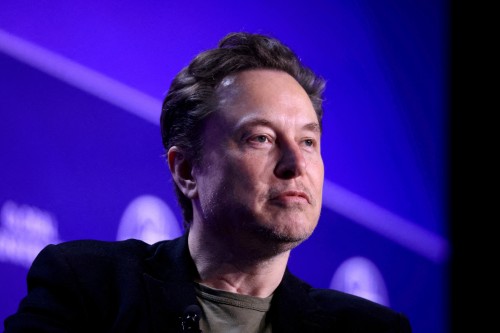 1
1 1
1
By Jack Queen
PHILADELPHIA (Reuters) -Elon Musk’s pro-Trump group does not choose the winners of its $1 million-a-day giveaway to registered voters at random, but instead picks people who would be good spokespeople for its agenda, a lawyer for the billionaire said on Monday.
Musk lawyer Chris Gober was trying to persuade a Pennsylvania judge that the giveaway was not an “illegal lottery,” as Philadelphia district attorney Lawrence Krasner alleged in a lawsuit seeking to block the contest ahead of Tuesday’s U.S. presidential election.
“There is no prize to be won, instead recipients must fulfill contractual obligations to serve as a spokesperson for the PAC,” Gober said in the hearing before Judge Angelo Foglietta.
The hearing in the battleground state comes just one day before Democratic Vice President Kamala Harris and Republican former President Donald Trump will square off in the tightly contested race. Musk and his political action committee are backing Trump.
Tesla CEO Musk’s offer is limited to registered voters in the seven states expected to decide the election – Arizona, Georgia, Michigan, Nevada, North Carolina, Pennsylvania and Wisconsin.
America PAC says its two remaining winners will be from Arizona and Michigan, meaning that Musk would likely be able to continue the giveaway even if Foglietta blocks the lottery.
“The only people protected by Pennsylvania law are in Pennsylvania,” said Richard Briffault, a professor at Columbia Law School.
But in courtroom testimony, Krasner said he would seek financial penalties against Musk and America PAC. He said he would not seek to take money back from the 16 voters who have so far won the contest.
“I’ll be seeking a lot more money than that for what Elon Musk and America PAC have done,” Krasner said under cross-examination.
Since Oct. 19, Musk has been giving a $1 million check every day to a randomly selected voter who has signed his petition supporting free speech and gun rights. Musk became an outspoken Trump supporter this year and has promoted the former president on his X social media platform.
Krasner, a Democrat, sued Musk and his political action committee in state court on Oct. 28 to try to block the giveaway, which he called an illegal lottery that violates state consumer protection laws.
A lawyer for Krasner’s office, John Summers, called Gober’s comments a “complete admission of liability.”
“We just heard this guy say, my boss, my client, called this random,” Summers said. “We promised people that they were going to participate in a random process, but it’s a process where we pre-select people.”
Summers later showed the court a clip of Musk at an Oct. 19 Trump rally telling attendees that America PAC would “randomly” award $1 million to people who sign the petition every day until the election. In the video, Musk also said “all we ask” is that the winners serve as spokespeople for the group.
“This was all political marketing masquerading as a lottery, albeit an illegal lottery,” Krasner said.
Philadelphia is the largest city in Pennsylvania, one of seven battleground states likely to determine the outcome of the race between Trump and Harris. Whichever candidate wins the state will receive its 19 electoral votes out of a total of 270 needed to win.
The giveaway falls in a gray area of election law, and legal experts are divided on whether Musk could be violating federal laws against paying people to register to vote.
The U.S. Department of Justice has warned America PAC the giveaway could violate federal law, according to media reports, but federal prosecutors have not taken any public action.
Musk has so far given nearly $120 million to America PAC, according to federal disclosures.
The Trump campaign is broadly reliant on outside groups for canvassing voters, meaning the super PAC founded by Musk, the world’s richest man, plays an outsized role in what is expected to be a razor-thin election.
(Reporting by Jack Queen; Additional reporting by Tom Hals; Writing by Luc Cohen; Editing by Noeleen Walder, Chris Reese and Alistair Bell)